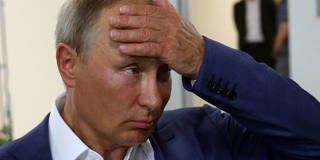Russia’s crony capitalism is weaker than it seems. In fact, President Vladimir Putin’s consolidation of power has created a major potential threat to his authority, because the lack of credible property rights forces senior Russian officials and oligarchs to hold their money abroad.
WASHINGTON, DC – Russian President Vladimir Putin’s authority is weaker than it seems. In fact, the bedrock of Putin’s power – the clientelist economic arrangements that he has assiduously consolidated over the past generation – has become the main threat to his political survival. The reason is simple: the lack of credible property rights under Putin’s system of crony capitalism forces senior Russian officials and oligarchs to hold their money abroad, largely within the jurisdictions of the Western governments against which Putin rails.
With the help of carefully selected loyalists, Putin has established three circles of power: the state, state-owned corporations, and loyalists’ “private” companies. The process began during his tenure as chairman of the Federal Security Service, from 1998 to 1999, when he wielded control over the secret police.
But it was Putin’s first term as president, from 2000 to 2004, that amounts to a true masterpiece of power consolidation by a budding authoritarian. First, in the summer of 2000, he took charge of Russian television. Next, he established his “vertical of power” over the state administration and the regional administrations, as well as his “dictatorship of law” over the judicial system. And then, in the 2003 parliamentary election, Putin gained solid control over both the State Duma (the lower house) and the Federation Council (the upper house) of the Russian legislature. At the pinnacle of state power, the Security Council, he installed three KGB generals: Sergei Ivanov, Nikolai Patrushev, and Aleksandr Bortnikov.

WASHINGTON, DC – Russian President Vladimir Putin’s authority is weaker than it seems. In fact, the bedrock of Putin’s power – the clientelist economic arrangements that he has assiduously consolidated over the past generation – has become the main threat to his political survival. The reason is simple: the lack of credible property rights under Putin’s system of crony capitalism forces senior Russian officials and oligarchs to hold their money abroad, largely within the jurisdictions of the Western governments against which Putin rails.
With the help of carefully selected loyalists, Putin has established three circles of power: the state, state-owned corporations, and loyalists’ “private” companies. The process began during his tenure as chairman of the Federal Security Service, from 1998 to 1999, when he wielded control over the secret police.
But it was Putin’s first term as president, from 2000 to 2004, that amounts to a true masterpiece of power consolidation by a budding authoritarian. First, in the summer of 2000, he took charge of Russian television. Next, he established his “vertical of power” over the state administration and the regional administrations, as well as his “dictatorship of law” over the judicial system. And then, in the 2003 parliamentary election, Putin gained solid control over both the State Duma (the lower house) and the Federation Council (the upper house) of the Russian legislature. At the pinnacle of state power, the Security Council, he installed three KGB generals: Sergei Ivanov, Nikolai Patrushev, and Aleksandr Bortnikov.